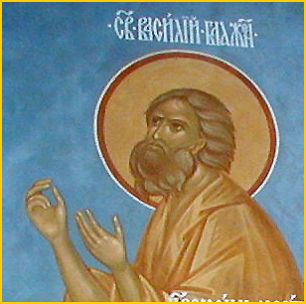|
|||
|---|---|---|---|
| This weekly bulletin insert complements the curriculum published by the Department of Christian Education of the Orthodox Church in America. This and many other Christian Education resources are available at http://dce.oca.org. | |||

The Church honors two men who, in different times and places and in very different ways, bravely confronted those in power. They are the Righteous Gamaliel and St. Basil, Fool for Christ. We meet Gamaliel in the Book of Acts (5: 34-39). He was a Pharisee, and was Saint Paul's teacher. Paul emphasizes the high quality of his education in the Jewish faith by saying he was "brought up...at the feet of Gamaliel" (22:3). That would impress everyone, for Gamaliel was "held in honor by all the people" (5:34). And Gamaliel himself was impressive in his deliberate, sensible way of thinking. When others were so enraged at the preaching of Peter and the other apostles that they wanted to kill them, Gamaliel stood against his fellow members of the body of spiritual elders, the powerful Sanhedrin. He recognized that the teaching of the apostles might be "of God" and warned the elders that if it was, they would "not be able to overthrow them." The elders took his advice, and freed the apostles (who would bravely disregard their order to refrain from further preaching in Jesus' name.) Gamaliel's cool, reflective manner was effective, but it is very different from that of another man who confronted power: Basil, the Holy Fool.
Many people, at least the Orthodox and those who have visited Moscow, know that the beautiful church in the Kremlin is named Saint Basil's Cathedral. But some aren't aware that it is not named for Saint Basil the Great, the fourth-century Church father. The Basil it is named for was born in the 15th century, to a poor family who lived near Moscow. After spending some time in the family work of shoemaking, he went to the big city and lived primitively, wearing little clothing and utterly ignoring the rules of "polite society." He challenged those who cheated others or failed to help the poor, and confronted people openly with their sins. But everything he did was for others' salvation, as when he entered low, stinking taverns to minister lovingly to people enslaved by drunkenness. While there were some who derided and abused him, many others recognized what he was doing and revered him. Among these admirers was the Tsar himself, the ruler known as Ivan the Terrible. Saint Basil was able to scold the Tsar for letting his mind wander in church without making him angry; in fact, Ivan was greatly in awe of this man who could read his thoughts. Once during Great Lent, Basil offered the Tsar some meat. Ivan was shocked, and refused, saying that of course he did not eat flesh during the Fast. Basil replied that it mattered little whether he actually ate flesh, since he had killed so many people. In this way he urged Ivan to repent; his challenge to Ivan was a brave act of love. That kind of bravery, standing for truth against powerful forces, is the reason why these two men, Gamaliel and Basil, are honored by the Church. |
|||
